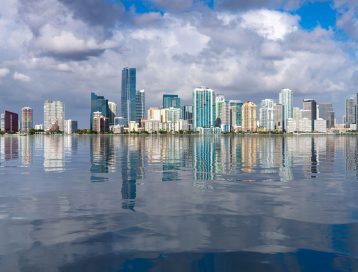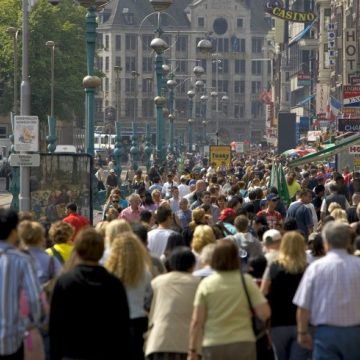Nature-based Solutions in New Orleans and Charleston
In New Orleans, Hurricane Katrina caused 1,833 deaths and over $153 billion in damage in 2005. Afterwards, much was invested in large-scale water safety such as levees and in hundreds of small-scale green-blue facilities such as 'Nature-based Solutions (NbS)'. Examples include wadis, rain gardens and permeable pavements. Charleston also has many water issues that require climate-adaptive measures for urban planning.
Making cities more robust
What robust solutions will work in these cities over time and what data are needed to do this? Deltares co-wrote Urban Planning proposals for New Orleans and Charleston. Soil water experts Roelof Stuurman, Floris Boogaard and Daan Rooze conducted research there to learn more about what is happening in the soil. Read more about the role of Deltares in New Orleans and Charleston, the work of our soil experts, the conclusion and where we are doing further active research in the US.
Measuring and monitoring groundwater is crucial to stop subsidence. You can't manage something you don't measure.
Roelof Stuurman, groundwater expert at Deltares
Urban Water Plan New Orleans
Deltares collaborated on 'Reshaping the Urban Delta' for New Orleans (Louisiana). This plan sets out how the city of New Orleans can become even more resilient against the increasing challenges posed by water and land subsidence. Groundwater experts from Deltares mapped the subsurface and the groundwater system there. Together with partners, Deltares also evaluated which Nature-based Solutions are present and whether they are efficient for delaying rainwater runoff, water infiltration and increasing biodiversity. Social values such as 'Raising awareness' and 'Capacity building' were also included in the evaluation.
In 2015, New Orleans started the design phase of the 'Mirabeau Water Garden', a 300-by-300-metre area where rainwater will be filtered and stored to relieve the built environment. Deltares monitored the subsoil and groundwater and calculated the opportunities for water storage and the impact on the environment, such as reduced subsidence and groundwater flooding.
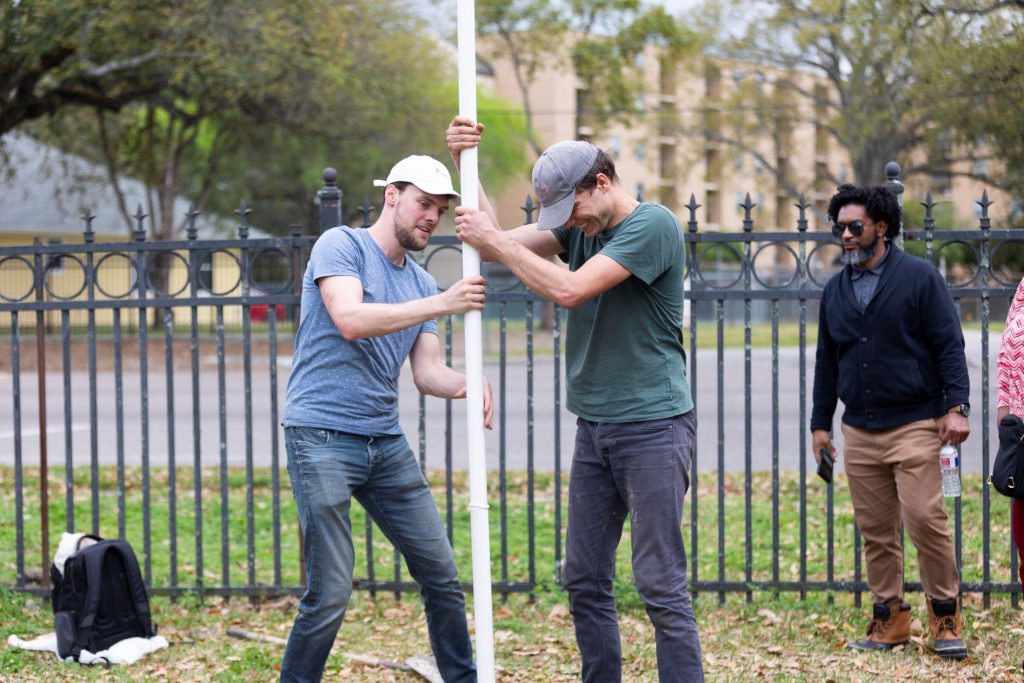
Climate Adaptive Water Plan Charleston
Together with other companies, Deltares drew up an urban water plan for Charleston (South Carolina) aimed at climate-adaptive measures for the next 25 years. In it, we contribute our expertise on dealing with groundwater and subsidence. To this end, the first 14 urban groundwater monitoring points were set up in August 2023. The data collected, including the measured groundwater regime, and estimated future groundwater levels (considering sea level rise) for urban planning, are now available via a public web viewer.
Our soil experts at work
Collecting field data in the city
Roelof: "Most coastal and delta cities with water problems or land subsidence do not have much information about the urban shallow subsurface and the fluctuation of the shallow groundwater. Nor do they usually realise how important sewer maintenance is to the groundwater system. Much groundwater is drained as a result, lowering the groundwater level. Based on measurements, we are trying to better describe the urban groundwater system."
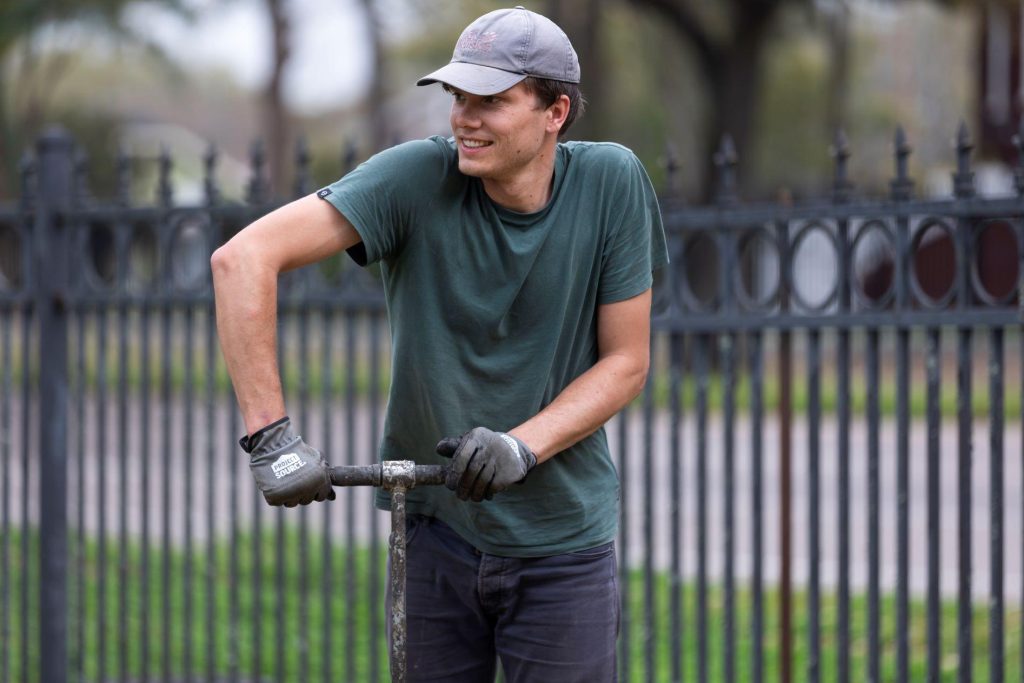
Bring your own drill!
Roelof: "We try to 'surface' this knowledge as quickly as possible. This often requires us to immediately carry out drilling and install groundwater monitoring points. For this, we bring along our own (Edelman) soil drilling set. In New Orleans, for instance, we previously carried out 75 shallow borings in a week together with Tulane University. As a result, we quickly understood the vulnerability to land subsidence and were able to estimate and map the highest and lowest groundwater levels. We also started installing urban groundwater monitoring networks. In Charleston, we implemented this in August 2023. In New Orleans, this will be done in November 2024."
Improvisation and dirty hands
Floris: "When doing fieldwork, we often have to improvise. That is also why we prefer to do it ourselves. The exact location of measuring points is very important for the representativeness of the data series. In addition, by doing the fieldwork ourselves, we learn a lot about the local system. This includes our geological and soil expertise. With this background knowledge, the data are then a lot easier to interpret.
Testing the infiltration capacity of green infrastructure is also part of our "dirty hands" portfolio. In the context of climate adaptation, lots, and lots of different types of 'Nature-based Solutions' are being constructed all over the world to neutralise rapid rainwater runoff. These are popular solutions for drivers because of their visibility. But their effectiveness, such as the amount of water storage and infiltration properties, has hardly been tested. In the field, we are trying to gather more knowledge on this, including with the deployment of water tanks."
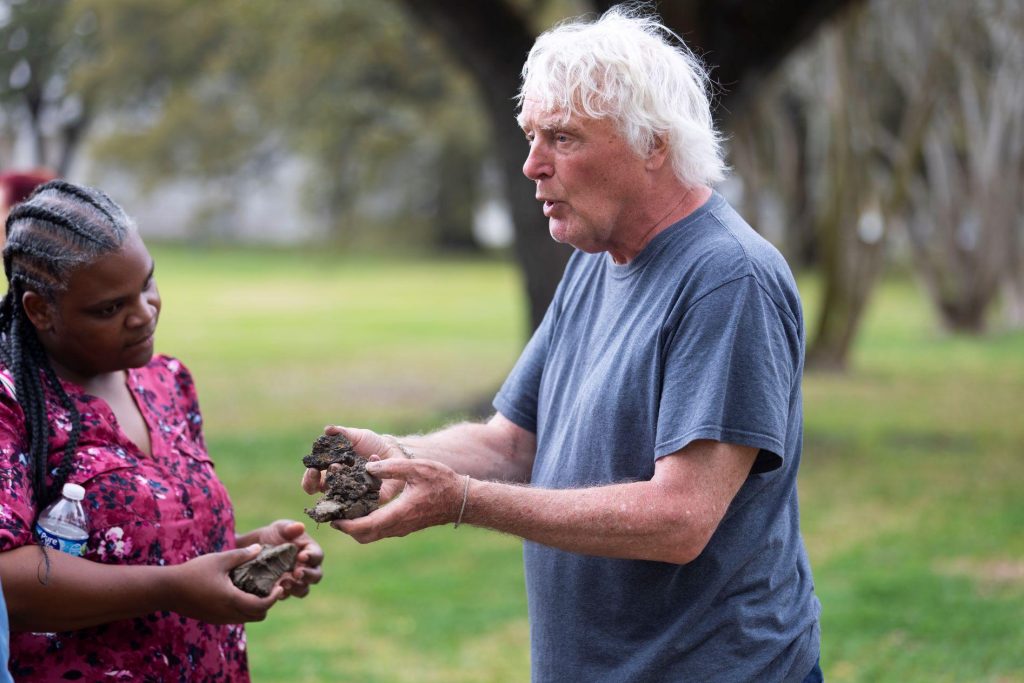
Involving residents helps
Floris: "Groundwork New Orleans, a local club that works on learning projects for young people, and also builds NbS, helped submerge dozens of green-blue facilities in New Orleans. A win-win as it allowed young people to gain new practical experiences. They provided equipment, tank trucks, and manpower, and we had arranged a permit to use fire pits for water supply. In lower NbS, testing was easy. A matter of installing sensors and cameras and letting them fill with water. After an hour or two, all the water had infiltrated.
In the case of permeable pavements, test sections had to be constructed with dykes first. This was not only about the hard data of emptying times of the facilities, but also about the story around it. For instance, can it be improved, and can the facility be managed, are residents satisfied, and do they feel involved? What are areas for improvement? Deltares has thus mapped more than 150 Nature-based Solutions in New Orleans!"
Conclusion: large water storage facilities needed in cities
Daan: "The report and conclusion contain points for improvement that range from simple interventions such as 'lay rain garden inlet lower than rainwater system inlet' to additional recommendations such as 'monitor water and soil quality' which currently receive little attention. Even though pollutants are known to accumulate after several years because green-blue facilities are also used as treatment facilities.
An important conclusion of this Nature-based Solutions study is that the cost (construction, maintenance) of small individual NbS is prohibitive to meet the water task. This can only be achieved by constructing large water storage sites, especially by creating more surface water. In addition, as much water as possible should be retained in urban capillaries - think gardens and car parks."
Further soil research in urban coastal areas in the US
Deltares is conducting more research in coastal urban areas in the US. Often, issues of sea level rise and urban drainage are addressed sectorally. To achieve more robust cities, it is important to properly understand the interaction between the different water and soil systems in the city and determine what adaptations are needed in relation to climate change and sea level rise with a focus on soil (groundwater and surface subsidence).



